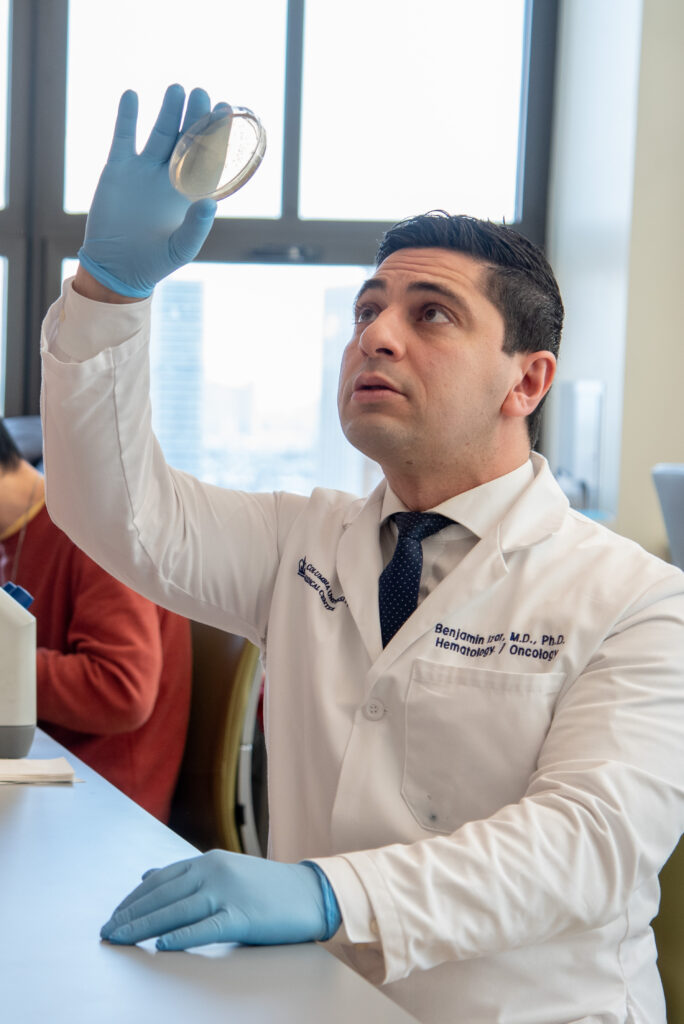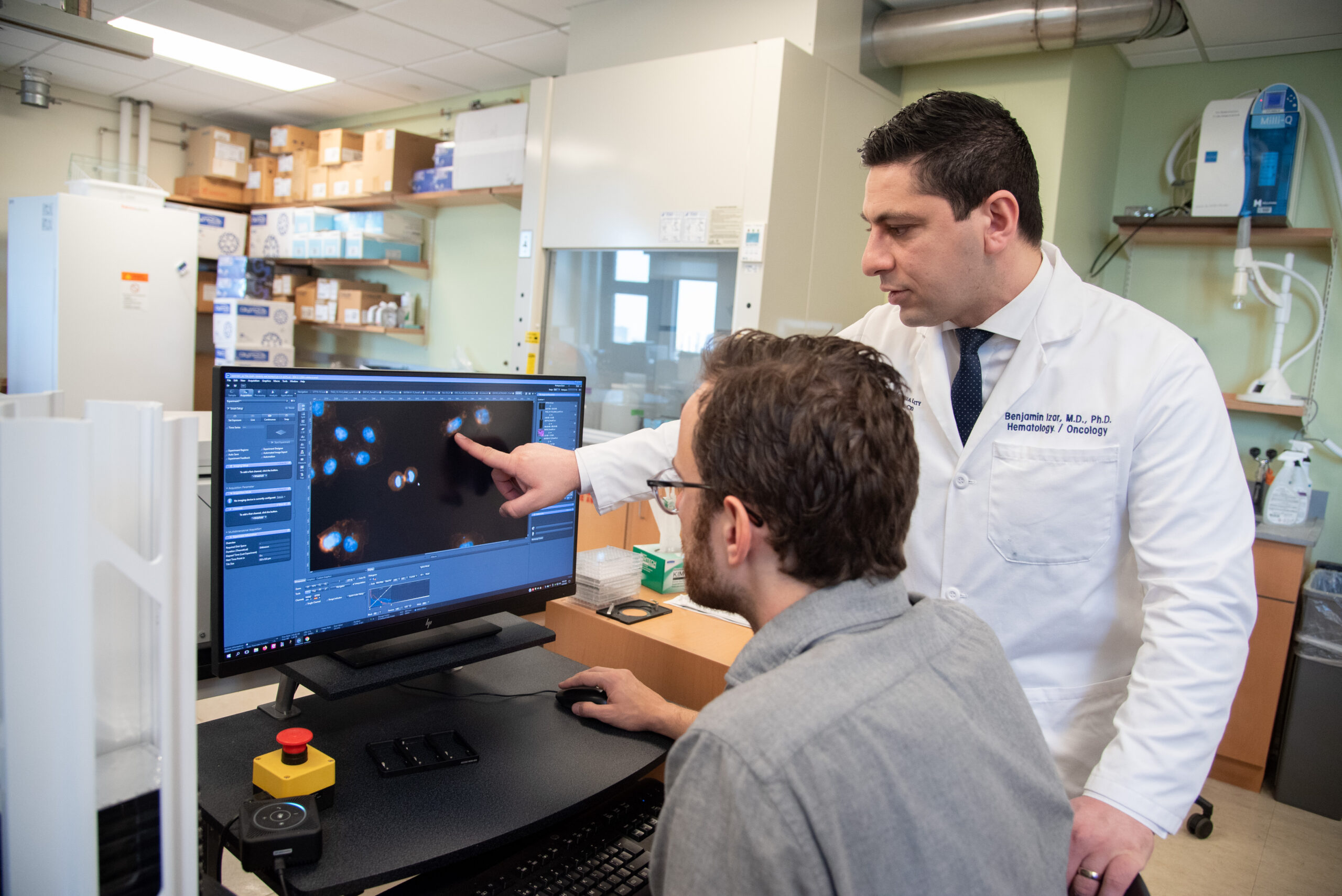Benjamin Izar, MD, PhD ‹ Back To 2023 Winners
2023 Winners
Assistant Professor
Medical Oncology and Systems Biology
Columbia University, Irving Medical Center
Vision
Brain metastasis is a common clinical challenge in patients with advanced melanoma and non-small cell lung cancer. Mechanisms that are important during each step of the brain-metastatic cascade, in particular the interaction of cancer cells with niche- and immune cells, are poorly understood. We developed a series of experimental and analytical innovations to enable spatio-temporal molecular profiling and dissection of cellular interactions during this intricate cascade – starting with the first cell all the way to a fully developed brain metastasis. Our vision is to leverage molecular mechanisms gleaned from these approaches to develop improved therapies for affected patients and thus address a major unmet need.
Benjamin Izar, MD, PhD is a physician-scientist and Assistant Professor of Medicine and Systems Biology at the Columbia University Irving Medical Center. Born and raised in Germany, he completed medical school at the Justus Liebig University Giessen, followed by training clinical training in internal medicine and medical oncology at Massachusetts General Hospital and Beth Israel Deaconess Medical center/Harvard Medical School. He completed post-doctoral training in the laboratory of Dr. Levi Garraway, followed by continued training in the laboratories of Drs. Aviv Regev and Kai Wucherpfennig at Dana-Farber Cancer Institute and the Broad Institute of MIT and Harvard. During this post-doctoral fellowship, Dr. Izar’s work focused on the intersection of cancer immunobiology and computational single-cell biology. In his independent laboratory program, which was established at Columbia University in November 2019, Dr. Izar focusses on studying the intersection of metastatic organotropism and immunity. He is the recipient of the NIH/NCI K08, R37 MERIT and R01 awards, Burroughs Wellcome Fund Career Award for Medical Scientists, AACR NextGen Star Award, Abeloff V Foundation Award, Tara Miller Melanoma Research Alliance Young Investigator Award, and a Louis V. Gerstner Jr. and Schaefer Research Scholar, and has recently been inducted to the American Society for Clinical Investigation.
A Genomic-Adaptive Axis Driving Mechanisms of Brain-Metastatic Organotropism
 Brain metastasis (BM) is the most common form of cancer of the brain in adults, occurs frequently in a variety of cancer types, and combined, is the most common cause of cancer-related deaths in the US, claiming 200,000 lives in 2022. BM most frequently affect patients with lung cancer, cause debilitating symptoms, and do not respond well to existing therapies (including immunotherapies). Despite recognition of this challenging problem, our molecular understanding of BM is rudimentary. Through several experimental and computational innovations, we have resolved the nuanced molecular ecosystems in patient BM. We discovered that BM are characterized by perpetual chaos of chromosomes, which can be summarized as chromosomal instability (CIN). In additional preliminary work, we connect changes that occur in cancer cells with high CIN with production of specific molecules (e.g. adenosine) that may explain both the preference to seed the brain and also suppress immune responses. In mouse experiments, we show that reducing CIN can reduce tumor growth and re-sensitize these to existing immunotherapies.
Brain metastasis (BM) is the most common form of cancer of the brain in adults, occurs frequently in a variety of cancer types, and combined, is the most common cause of cancer-related deaths in the US, claiming 200,000 lives in 2022. BM most frequently affect patients with lung cancer, cause debilitating symptoms, and do not respond well to existing therapies (including immunotherapies). Despite recognition of this challenging problem, our molecular understanding of BM is rudimentary. Through several experimental and computational innovations, we have resolved the nuanced molecular ecosystems in patient BM. We discovered that BM are characterized by perpetual chaos of chromosomes, which can be summarized as chromosomal instability (CIN). In additional preliminary work, we connect changes that occur in cancer cells with high CIN with production of specific molecules (e.g. adenosine) that may explain both the preference to seed the brain and also suppress immune responses. In mouse experiments, we show that reducing CIN can reduce tumor growth and re-sensitize these to existing immunotherapies.
“Not all metastatic sites are created equal – both in terms of biology and clinical implications. The Pershing Square Sohn Prize will allow us to study the critical intersection of niche-specific metastatic organotropism and immunity”

In this proposal, we will 1) continue to validate the associations of CIN, BM and immunosuppression in molecular and histological profiling data of thousands of patients, 2) dissect the intricate biochemical mechanisms by which CIN leads to BM, and 3) through additional technical innovations, capture the entire history of cancer cells from first reaching the brain all the way to forming a full-fledged metastasis. Upon completion, this work will provide a comprehensive understanding of human BM biology and pave the way for novel therapeutic development.
“Innovation is not optional but necessary – as we explore novel biology with clinical relevance, experimental and analytical innovation is our
constant companion as we enter uncharted territory”